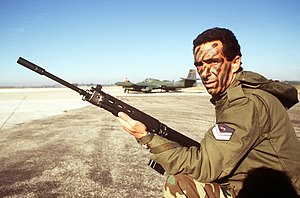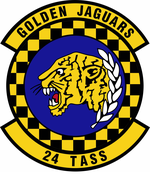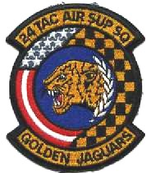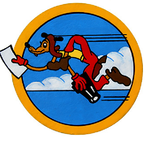The 24th Tactical Air Support Squadron (24 TASS) was a ground attack squadron of the United States Air Force. It was last active at Nellis Air Force Base in Nevada, prior to being inactivated during December 2020.
| 24th Tactical Air Support Squadron | |
|---|---|
 A Uruguayan tactical air controller stands guard over a squadron OA-37 Dragonfly | |
| Active | 1939–1942; 1942–1946; 1947–1949; 1951–1953; 1956–1960; 1969–1975; 1976–1991; 2018–2020 |
| Country | |
| Branch | |
| Part of | Air Combat Command |
| Nickname(s) | Golden Jaguars |
| Engagements | China Burma India Theater |
| Decorations | Air Force Outstanding Unit Award |
| Insignia | |
| 24th Tactical Air Support Squadron emblem (approved 21 June 2018)[1] |  |
| Patch with 24th Tactical Air Support Squadron emblem (1976–1991) |  |
| 24th Combat Mapping Squadron emblem (approved 2 April 1945)[2] |  |
Proving ground unit
editThe first predecessor of the 24 TASS was the 24th Bombardment Squadron (Light) which was activated in late 1939 as a test unit for light bombardment aircraft at Maxwell Field, Alabama. The squadron was disbanded in the spring of 1942 in a reorganization of United States Army Air Forces operational testing units in the spring of 1942.[3]
Mapping in the Pacific
editThe second predecessor of the squadron was activated in the fall of 1942 as the 24th Photographic Mapping Squadron. After training in the United States under Second Air Force, the squadron deployed to the China Burma India Theater, where it performed combat mapping. mostly with North American B-25 Mitchells and Consolidated B-24 Liberators equipped with vertical and oblique Mapping cameras until moving to Clark Field in the Philippines, where it was inactivated in 1946. In Asia, the squadron deployed detachments to a number of locations, although the headquarters remained in Guskhara Airfield, India.[2]
Air Force reserve
editThe squadron was activated again in the reserves in 1947 as the 24th Reconnaissance Squadron, but apparently was not equipped before inactivating when Continental Air Command reorganized under the Wing Base Organization plan in 1949.
Strategic Air Command
editThe squadron was activated in the regular Air Force in 1951 as the 24th Strategic Reconnaissance Squadron at Lake Charles Air Force Base, Louisiana and equipped with Boeing RB-29 Superfortresses. When its parent 68th Strategic Reconnaissance Wing converted to a bombardment mission in 1952, the squadron became the 24th Bombardment Squadron, but was inactivated in 1953,[2] and its personnel and equipment were transferred to the 656th Bombardment Squadron, which was simultaneously activated.[note 1]
Helicopter operations
editThe 24th Helicopter Squadron was activated in 1956 at Sewart Air Force Base, Tennessee. After several months of training the squadron moved to Tachikawa Air Base, Japan, where it served until 1960. The transfer was made on an aircraft carrier of the United States Navy.[4] The unit's mission was to maintain helicopter logistics airlift capability, to perform air land supply operations, scheduled and special airlift operations, and conduct training.[5] Detachment 2 of the squadron was attached to the 41st Air Division to provide logistical support to the division's remote radar sites.[6] In 1958 and 1959 the squadron returned to Burma when it participated in Operation South Bound, which provided assistance to the Burmese Air Force in combatting local insurrectionists.[7][8]
Operations in Central and South America
editThe squadron was redesignated the 24th Special Operations Squadron and activated in Panama in 1969. In 1985, the squadron was consolidated with its two predecessor units. The consolidated squadron became the 24th Tactical Air Support Squadron in 1987, and was inactivated in the spring of 1991.
Close air support training
editThe 24 Tactical Air Support Squadron was activated on 2 March 2018 at Nellis Air Force Base, Nevada. It was the USAF's Forward Air Controller – Airborne schoolhouse for the Lockheed Martin F-16 Fighting Falcon as well as supporting the joint terminal attack controller qualification course and Weapons School.[9]
The squadron was inactivated during a ceremony at Nellis on 23 December 2020.[10]
Lineage
edit- 24th Bombardment Squadron
- Constituted as the 24th Attack-Bombardment Squadron on 1 August 1939
- Redesignated 24th Bombardment Squadron (Light) on 28 September 1939
- Activated on 1 December 1939
- Disbanded on 1 May 1942
- Reconstituted on 19 September 1985 and consolidated with 24th Bombardment Squadron, Medium and 24th Composite Squadron as 24th Composite Squadron[1]
- 24th Strategic Reconnaissance Squadron
- Constituted as the 24th Photographic Mapping Squadron on 14 July 1942
- Activated on 2 September 1942
- Redesignated as 24th Photographic Squadron, Heavy on 6 February 1943
- Redesignated as 24th Combat Mapping Squadron on 11 August 1943
- Inactivated on 15 June 1946
- Redesignated 24th Reconnaissance Squadron, Very Long Range, Photographic, Radar Counter-Measures on 13 May 1947
- Activated in the reserve on 12 July 1947
- Inactivated on 27 June 1949
- Redesignated 24th Strategic Reconnaissance Squadron, Medium, Photographic on 4 October 1951
- Activated on 10 October 1951
- Redesignated 24th Bombardment Squadron, Medium on 16 June 1952
- Redesignated 24th Strategic Reconnaissance Squadron, Medium and inactivated on 16 January 1953
- Consolidated on 19 September 1985 with 24th Bombardment Squadron, (Light) and 24th Composite Squadron as 24th Composite Squadron[1]
- 24th Tactical Air Support Squadron
- Constituted as the 24th Helicopter Squadron on 24 February 1956
- Activated on 9 July 1956
- Inactivated on 8 March 1960
- Redesignated 24th Special Operations Squadron on 6 March 1969
- Activated on 18 March 1969
- Redesignated 24th Composite Squadron on 15 November 1973
- Inactivated on 1 July 1975
An F-16C Fighting Falcon on display at Aviation Nation 2019 at Nellis Air Force Base.
- Consolidated with 24th Bombardment Squadron, Medium and 24th Bombardment Squadron, Medium on 19 September 1985
- Redesignated 24th Tactical Air Support Squadron on 1 January 1987
- Inactivated on 31 March 1991
- Activated on 2 March 2018[1]
- Inactivated on 23 December 2020
Assignments
edit- 23d Composite Group (later Air Corps Proving Ground Detachment, Air Forces Proving Ground Group): 1 December 1939 – 1 May 1942
- 5th Photographic Group (later 5th Photographic Reconnaissance and Mapping Group, 5th Photographic Reconnaissance Group), 2 September 1942
- Third Air Force, 9 October 1943
- III Reconnaissance Command, 12 October 1943
- Army Air Forces, India-Burma Sector, 26 December 1943 (attached to 5306th Photographic and Reconnaissance Group (Provisional), 26 December 1943 – 17 January 1944, Tenth Air Force)
- Tenth Air Force, 7 March 1944
- 8th Photographic Reconnaissance Group (later 8th Reconnaissance Group), 25 April 1944
- Army Air Forces, India-Burma Theater, 20 September 1945
- Thirteenth Air Force, 28 January 1946
- 313th Bombardment Wing, 1 April 1946 − 15 June 1946
- 68th Reconnaissance Group, 12 July 1947 − 27 June 1949
- 68th Strategic Reconnaissance Group, 10 October 1951 (attached to 68th Strategic Reconnaissance Wing)
- 68th Bombardment Wing, 16 June 1952 − 16 January 1953
- Eighteenth Air Force, 9 July 1956
- 315th Air Division: 13 October 1956 − 8 March 1960
- 24th Special Operations Wing (later 24th Special Operations Group, 24th Composite Group), 18 March 1969 − 1 July 1975
- 24th Composite Wing, 1 January 1976
- USAF Southern Air Division, 31 January 1987
- 24th Composite Wing, 1 January 1989
- Air Forces Panama, 15 February − 31 March 1991
- 57th Operations Group, 2 March 2018 – 23 December 2020
Stations
edit
|
|
Detachment Locations during World War II
edit- Hsinching Airfield, China, 17 March 1944 – 9 April 1944, 27 April 1944 − c. 1 July 1944, October–November 1944
- Jorhat Airfield, India, 9 April 1944 – 22 April 1944
- Liuchow Airfield, China, 10 July 1944 – 22 September 1944
- Chanyi Airfield, China, 22 September 1944 – 17 February 1945
- Pengshan Airfield, China, November 1944
- Tulihal and Cox's Bazar, India, February 1945 − c. April 1945
Aircraft
edit
|
|
|
Awards and campaigns
edit| Award streamer | Award | Dates | Notes |
|---|---|---|---|
| Air Force Outstanding Unit Award | 1 January 1957 – 1 August 1958 | 24th Helicopter Squadron[1] | |
| Air Force Outstanding Unit Award | 18 March 1969 – 13 April 1970 | 24th Special Operations Squadron[1] | |
| Air Force Outstanding Unit Award | 2 June 1970 – 3 July 1970 | 24th Special Operations Squadron[1] | |
| Air Force Outstanding Unit Award | 16 March 1971 – 15 March 1973 | 24th Special Operations Squadron[1] | |
| Air Force Outstanding Unit Award | 1 July 1976 – 30 June 1978 | 24th Composite Squadron[1] | |
| Air Force Outstanding Unit Award | 1 April 1982 – 31 March 1984 | 24th Composite Squadron[1] | |
| Air Force Outstanding Unit Award | 20 December 1989 – 14 February 1991 | 24th Tactical Air Support Squadron[1] |
| Campaign Streamer | Campaign | Dates | Notes |
|---|---|---|---|
| India-Burma | 5 January 1944 – 28 January 1945 | 24th Combat Mapping Squadron[1] | |
| Central Burma | 29 January 1945 – 15 July 1945 | 24th Combat Mapping Squadron[1] | |
| China Defensive | 5 January 1944 – 4 May 1945 | 24th Combat Mapping Squadron[1] |
References
editNotes
edit- Explanatory notes
- ^ SAC found itself with two 24th Bombardment Squadrons when the 24th Strategic Reconnaissance Squadron became a bombardment unit. The 24th Bombardment Squadron, Medium, assigned to the 68th Wing, and the 24th Bombardment Squadron, Heavy at Walker Air Force Base, assigned to the 6th Bombardment Wing. SAC elected to replace the squadron at Chennault. Maurer, Combat Squadrons, pp. 125–127.
- Citations
- ^ a b c d e f g h i j k l m n o Haulman, Daniel L. (5 December 2018). "Factsheet 24 Tactical Air Support Squadron (ACC)". Air Force Historical Research Agency. Archived from the original on 12 January 2019. Retrieved 12 January 2019.
- ^ a b c Maurer, Combat Squadrons, pp. 126–127
- ^ Maurer, Combat Squadrons, p. 125
- ^ Abstract, History 314th Troop Carrier Wing Jul–Dec 1956 (retrieved 10 July 2013)
- ^ Abstract, History 24th Helicopter Sq Jan–Jun 1958 (retrieved 10 July 2013)
- ^ a b Abstract, History 41st Air Div Jul–Dec 1956 (retrieved 10 July 2013)
- ^ Abstract, History 24th Helicopter Sq July–Dec 1958 (retrieved 10 July 2013)
- ^ Abstract, History 24th Helicopter Sq Jan–Jun 1959 (retrieved 10 July 2013)
- ^ Sarver, A1C Andrew D. (16 March 2018). "24th TASS activates, focuses on close air support". 99th Air Base Wing Public Affairs. Archived from the original on 21 March 2018. Retrieved 12 January 2019.
{{cite web}}: CS1 maint: numeric names: authors list (link) - ^ Mathison, 2nd Lt. Nicolle E. (28 December 2020). "24th Tactical Air Support Squadron inactivates, leaving mark on joint integration, close a". Nellis Air Force Base. Archived from the original on 4 February 2021. Retrieved 2 January 2021.
{{cite web}}: CS1 maint: numeric names: authors list (link)
Bibliography
editThis article incorporates public domain material from the Air Force Historical Research Agency
- Maurer, Maurer, ed. (1983) [1961]. Air Force Combat Units of World War II (PDF) (reprint ed.). Washington, DC: Office of Air Force History. ISBN 0-912799-02-1. LCCN 61060979. Retrieved 17 December 2016.
- Maurer, Maurer, ed. (1982) [1969]. Combat Squadrons of the Air Force, World War II (PDF) (reprint ed.). Washington, DC: Office of Air Force History. ISBN 0-405-12194-6. LCCN 70605402. OCLC 72556. Retrieved 17 December 2016.
- Ravenstein, Charles A. (1984). Air Force Combat Wings, Lineage & Honors Histories 1947–1977. Washington, DC: Office of Air Force History. ISBN 0-912799-12-9. Retrieved 17 December 2016.
- AF Pamphlet 900-2, Unit Decorations, Awards and Campaign Participation Credits Archived 4 August 2015 at the Wayback Machine Department of the Air Force, Washington, DC, 15 June 1971
- AF Pamphlet 900-2, Unit Decorations, Awards and Campaign Participation Credits, Vol II Archived 4 August 2015 at the Wayback Machine Department of the Air Force, Washington, DC, 30 September 1976, p.
External links
edit- Tails Through Time: Short Trips on the Long Road of Aviation History – The 24th Combat Mapping Squadron:Unsung Heroes of the Pacific War Retrieved 10 July 2013.
- CBI Unit Histories – 24th Combat Mapping Squadron Retrieved 10 July 2013.
- "A Tale of Two Airplanes" by Kingdon R. "King" Hawes, Lt Col, USAF (Ret.)